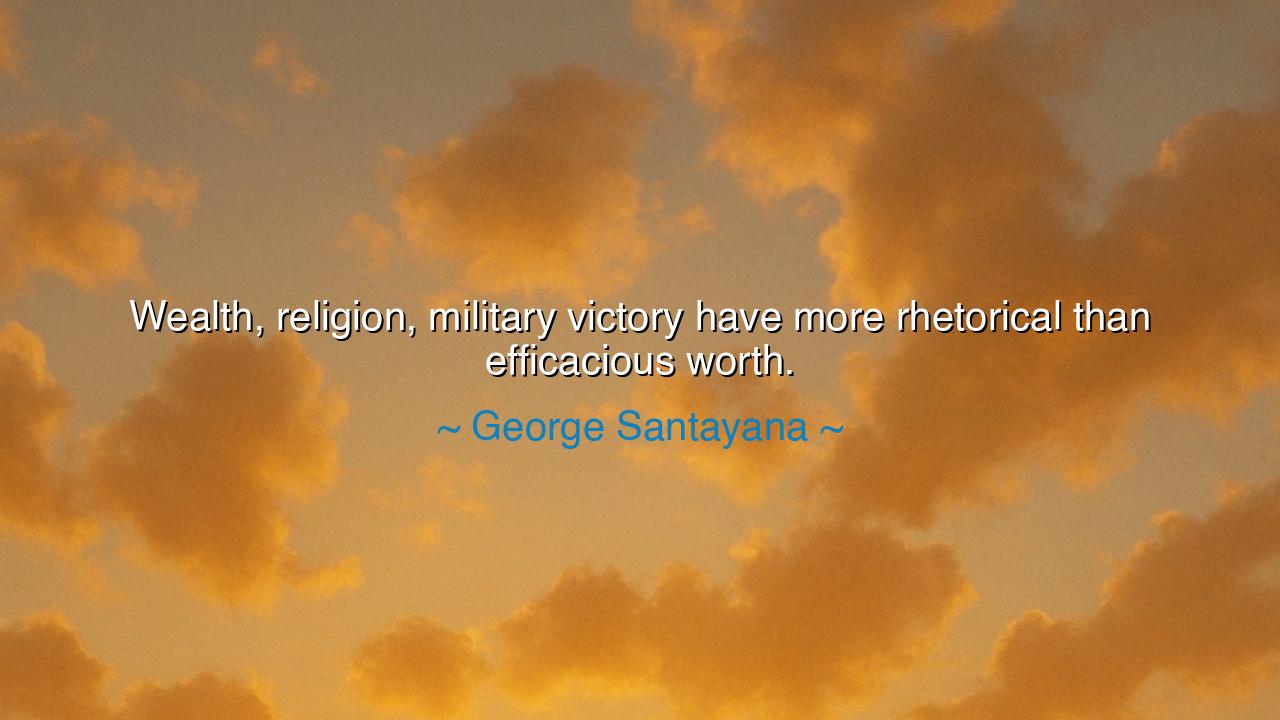
Wealth, religion, military victory have more rhetorical than






Hear now the words of the philosopher George Santayana, spoken with the sharpness of a blade honed upon truth: “Wealth, religion, military victory have more rhetorical than efficacious worth.” At first, these words may strike the ear as strange, for are not wealth, faith, and victory the very trophies by which men measure greatness? Yet Santayana, with the vision of one who sees beyond the veil, reminds us that these prizes, though glorious in story and speech, rarely hold the enduring power that human hearts imagine. Their worth often lies more in the boasting, the tale, the rhetoric, than in the true efficacy to change the soul or elevate the human condition.
Consider wealth: it dazzles the eye, it gathers followers, it builds palaces and monuments. Yet its power fades quickly, for riches are fragile as dust in the wind. Countless kings have hoarded gold, and yet their kingdoms fell when justice was absent and wisdom abandoned. Recall the fall of Croesus, the mighty king of Lydia, famed for his immeasurable riches. His gold, though sung of by many, could not protect him from the armies of Persia. His wealth lived on in stories, yes, but its power to save him proved illusory. Thus Santayana’s words ring true: wealth is often stronger in legend than in life.
Now ponder religion, not as the quiet voice of personal faith, but as the grand spectacle wielded by rulers and institutions. How many empires raised banners in the name of gods, proclaiming their cause righteous and eternal! And yet, when stripped of pageantry, it was often the courage of the people, not the blessing of heaven, that sustained nations. The Crusades, for example, were declared holy wars, wrapped in the mantle of divine sanction. Songs were sung, sermons preached, and countless were stirred by the rhetoric of salvation through battle. Yet what was left after centuries of bloodshed? Shattered kingdoms, weary peoples, and no eternal peace. The words burned brighter than the deeds.
And what of military victory? History resounds with triumphant shouts of conquerors who declared themselves masters of the earth. The Roman generals returning in triumph were crowned with laurel wreaths, their names sung as eternal victors. Yet how many of those victories endured? The empire of Alexander stretched across the world, yet within a few years of his death, it crumbled into fragments. The glory of victory was eternal only in the mouths of poets and orators; in reality, its efficacy was fleeting. Victories inspire, yes, but they are often echoes louder in speech than in substance.
This, then, is Santayana’s wisdom: the worth of these things lies more in how they are spoken of than in how they truly endure. Men tell tales of wealth long after the coins have rusted, they sing of holy wars long after the faith has waned, and they remember victories long after the empires have dissolved. It is rhetoric, the art of memory and story, that keeps them alive. The true efficacy—the ability to change the fabric of existence—is far less than their thunderous reputation.
But take heed, O children of the future: this is not to despise wealth, nor faith, nor triumph. It is to see them for what they are, to strip away illusion and grasp their true measure. Seek not to live for these alone, for they are shadows that pass swiftly. Instead, build upon what truly endures: wisdom, justice, compassion, and truth. These are not merely rhetorical, for they transform the human heart and shape societies across ages.
Thus let the lesson be clear: do not chase glory for its applause, nor faith for its pageantry, nor wealth for its glitter. Instead, ask always, “What will endure when the story fades?” Let your life be anchored in deeds that bear fruit beyond rhetoric—acts of kindness, the pursuit of knowledge, the defense of justice. These alone outlast the empty thunder of wealth and war. In this way, you will leave behind not merely a tale, but a legacy that breathes life into generations yet unborn.






AAdministratorAdministrator
Welcome, honored guests. Please leave a comment, we will respond soon